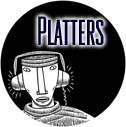
Comment
on this story
|
 |

This Week: Three Disappointments
Miroslav Vitous
Universal Syncopations (ECM)
It's an A-list: Jan Garbarek, John McLaughlin, Chick Corea, Jack Dejohnette, and Vitous himself on bass. Yet perversely enough, this quintet unites in full only on the lengthy mosaic "Univoyage." The personnel thereafter break into smaller units for a series of intimate vignettes, with Vitous' lithe bass work being the one constant. He's in top form, sparring with McLaughlin's rabbit-quick guitar in "Faith Run" and feeding the ethereal synergy of Corea and Garbarek in "Sun Flower." Saxophonist Garbarek is a major presence, leading the way on "Bamboo Forest" and "Brazil Waves" (the titles are descriptive enough), digging in on "Tramp Blues," and engaging in an icy call and response with Vitous in "Beethoven." This is one of Jan's finest efforts anywhere.
The full program is less than satisfying on first listen, though, lacking somewhat in cohesion and direction. A couple of choice melodies aside, most of Vitous' compositions are just the barest of sketches, and the group doesn't quite make up the difference with any flat-out improvising. Everyone errs on the side of reticence, which is normal perhaps for Garbarek, but it's strange to hear McLaughlin, Corea, and Dejohnette so reserved in each other's company. The continual reconfiguring of the players is somewhat disorienting, as well. And then there's the brass trio that augments three of the tunes, suggesting something of an overdubbed salvage job. Make no mistake, there's nothing sub-par on the album, and most of the tracks are very rewarding indeed. But fashioning these individual syncopations into a universal whole is a task left entirely up to the listener.
—Chris Mitchell
Terence Trent D'Arby
Wildcard—The Jokers Edition (Sananda Records)
Terence Trent D'Arby (a.k.a. Sananda Maitreya) has musical chops ad infinitum. He is the original Lenny Kravitz. He is a multi-instrumentalist & self-producing grand wizard who has a voice that was divined by the gods. With that having been said, one must ask the question: why TTD, why?! With the release of Wildcard—The Jokers Edition, D'Arby has abdicated the throne upon which he sat. A rightful occupant atop the perch that once housed/houses such nimble-footed, hard to pigeon-hole, mind-blowing musical minds like Prince, Dionne Farris, and Beck, D'Arby has temporarily (one would hope) abdicated his right to brag about his musical prowess. He has produced his own Rainbow Children, Prince's rambling "introspective" musical statement that was a feeble attempt at an artistic magnum opus.
Seemingly, D'Arby is exhausted musically, and like others before him, he is desperate to prove to himself that his best days are not behind him. He lays out a slew of non-eventful songs that reek of mediocrity, and he cloaks this musical failure in a stream of out-worldly and "wise" lyrics.
Wild Card does have some good tracks on it, enough of them to make an EP perhaps, or to serve as add-ons to a greatest hits collection. The second track is an electronic-heavy, strutting song whose beautiful refrain is as much about its lyrical rhyme as it is about its melody. Arguably, the best song on the album is the first track, a brassy retro s\ong that is further brightened by D'Arby's awesome vocal range. These songs indicate that he still has potential and there still may be some hope in this currently feeble songbird.
—Ekem Lartson
Bill Frisell
The Intercontinentals (Nonesuch)
How did guitarist Bill Frisell c. 1985 travel from brashly smearing Coltrane's revered classic "Resolution" with guitar synth lines as broad as a whitewash brush to this pointillist 2003 offering? A veteran of wrestling with John Scofield's hollow-bodied lyricism, thrashing guitarist Arto Lindsay's so-called "skronk," and head-butting rowdies the likes of bassist Melvin Gibbs and drummer Ronald Shannon Jackson, on Intercontinentals, Frisell finds himself tip-toeing around violin, calabash, steel guitar, and oud. OK, so a musician evolves....
Not that the result is entirely unpleasant, nor unplayable on WDVX. Certainly there's evolution of the overt Americana reflected in recent Frisell releases, adding a touch of the Third World with inclusion of artists from some such far reaches as Brazil (Vinicius Cantuaria), Mali (Sidiki Camara on percussion), and Greece (Christos Govetas on oud). However, Frisell's near exclusive affection for the round-like song form continues, with results that can be labored and ponderous.
Take for example the first cut, "Boubacar," a sleepy and repetitive six-minute rendering of the same not uninteresting chorus, however the sheer lack of variety in the presentation is maddening. The segue into the second cut, "Good Old People," promises change, but ultimately falls into a similar redundant groove. Finally cut four, "Baba Drame," shows some real life, with Greg Leisz and Jenny Scheinman permitted to briefly unleash their respective lap steel guitar and violin; even Frisell lurks menacingly deep in the mix, but never lets go before the fade.
Ultimately this promising mix of American and World music slumbers too much to capture the imagination, in due course sliding into the background, not likely to cause much offense or interest.
—Jonathan B. Frey

October 23, 2003 * Vol. 13, No. 43
© 2003 Metro Pulse
|